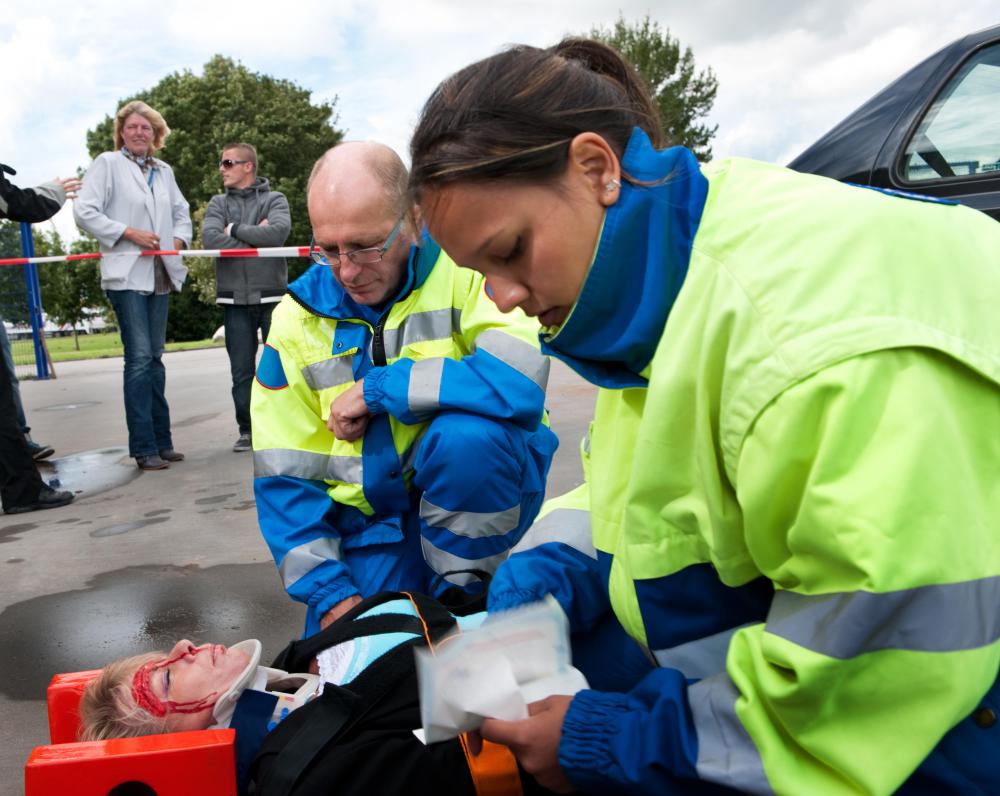At WiseGEEK, we're committed to delivering accurate, trustworthy information. Our expert-authored content is rigorously fact-checked and sourced from credible authorities. Discover how we uphold the highest standards in providing you with reliable knowledge.
What is Blood Volume?
Blood volume is a measurement of the volume, or amount of space, that the blood takes up in a given person. This includes both red blood cells and plasma; it is not limited to one particular part of blood. Maintaining a normal volume of blood is very important as it carries oxygen and essential nutrients throughout the body. If a person loses too much blood because of a bleeding wound or because of inadequate blood cell synthesis, dangerously low blood pressure can result and may cause vital organs to receive inadequate amounts of oxygen and nutrients.
There are many different factors that affect blood volume from person to person. Females, on average, have less blood than males do, and the bodies of children tend to contain less than those of grown men or women. Most people have roughly 1.2 gallons (4.7 liters) of blood in their bodies. Blood makes up approximately 1/11 of human body weight. People who live at high altitudes tend to have a higher volume because there is less oxygen in the air; the extra blood is needed to carry additional oxygen throughout the body.

Blood volume is regulated by the excretory system, particularly by the action of the kidneys. When the amount of blood in the body increases to a certain point, blood pressure increases and, through mechanisms involving nerves and hormones, a signal is sent to the kidneys. The kidneys then reabsorb less fluid, causing more water and other substances necessary to blood production to be lost through urination, decreasing the volume of blood. The opposite happens when there is too little blood; the kidneys reabsorb more water and other substances necessary for blood, causing less to be lost through urination. Through this and other mechanisms, blood pressure and volume are regulated and maintained at healthy levels.

The volume of blood in a pregnant woman increases drastically over the normal amount of blood in the body, and it can actually increase by 25 to 50% because the developing fetus and the woman's enlarged reproductive organs both need more blood. To supply this blood, the heart must beat harder and faster than usual and some blood vessels grow larger. In most cases, the volume of the plasma component of blood increases more than the volume of red blood cells. This can lead to cases of anemia in pregnant women, which tends to cause dizziness and fatigue.
AS FEATURED ON:
AS FEATURED ON:

















Discussion Comments
Why can racers get extra oxygen in their muscle cells?
I'm a bit overweight and I sometimes get heart palpitations. They can be really scary, and I have to sit and breath steadily until they pass.
I wonder if this is because I have a low blood volume for my body size, or maybe that my heart has to beat harder to get the blood around my body?
It really made me want to exercise, but people who are too overweight can't really exercise hard. So I walk and go swimming.
Going for walks has made a big difference already to me, both in terms of my size and my heart health. I hardly ever get palpitations anymore.
@Kat919 - Another option is to give blood plasma instead of whole blood. The blood service is always looking for regular plasma donors.
If you give plasma they return the red blood cells to you during the process, and this allows your total blood volume to return to normal more quickly, so you can give more often. I think you can give plasma every three weeks in fact, without repercussions.
Often people don't have time to give plasma because it takes longer than giving blood. You have to sit for over half an hour so the machine has time to filter the red blood cells from your plasma and pump them back into your body.
But, if you can commit to doing it regularly, you will really be making a difference to people's lives.
@dfoster85 - That must have been really scary! I did notice my heart beating faster, too. What I really noticed was getting rid of all that extra fluid/blood volume after giving birth (night sweats and bathroom visits).
I just want to remind everyone that human blood volume, for most people, leaves you with some to spare. Have you donated blood recently? You can save three lives (often premature babies, the number one consumer of donated blood). Plus, the Red Cross always has yummy snacks for after you donate. Easy way to get some good karma. Your body replaces the lost blood within just a couple of days.
The increase in total blood volume in pregnancy is wild! It accounts for a surprising amount of the weight gain, if you've ever wondered how an eight-pound baby equals a thirty-pound weight gain. But of course, some of that new blood is circulating through the baby as s/he grows. It's part pf why pregnant women need to drink so much water, too.
I actually had palpitations (racing heart) during my pregnancy a couple of times. I called my doctor, who said that I could take it easy and have something to eat and wait half an hour, but that if it didn't go down, I had to go to the hospital. And since I worked at a university where everyone took the train to work, I would have had to call an ambulance! The only thing that finally worked was to sit in a quiet room and do conscious relaxation.
Post your comments